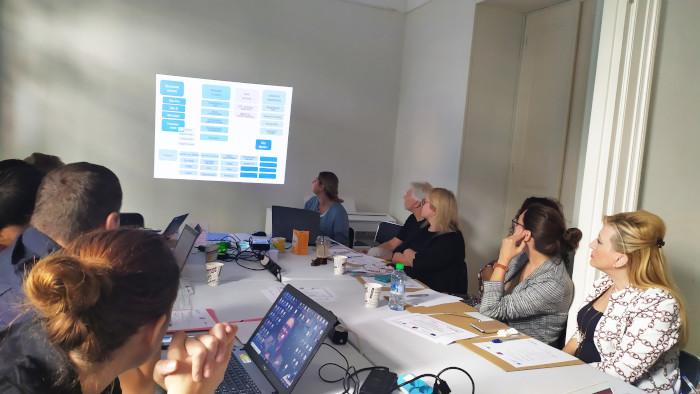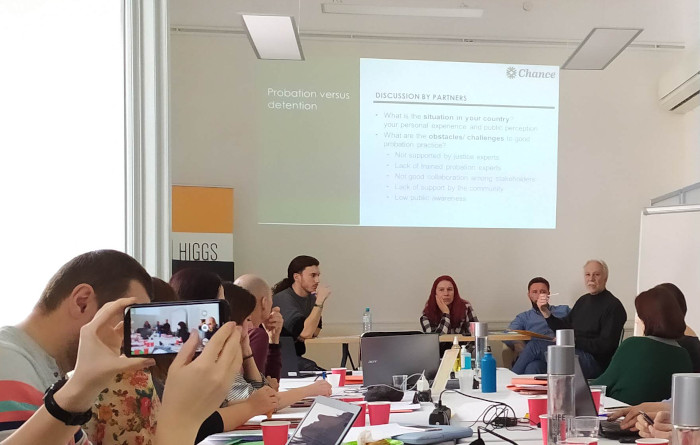
The Chance project
The ‘CHANCE – Changing Lives by Community Engagement’ project main goal is to contribute to the implementation of effective community-based measures. It aims to develop a set of recommendations on child-friendly and rehabilitative community-based measures in Europe.
This is expected to be achieved through the project’s main activities, which include the training of professionals working within juvenile justice systems, and an awareness-raising campaign geared towards civil society on the benefits of the implementation of community-based measures.
The principal direct beneficiaries of the project will be professionals from youth justice services, local authorities and NGOs which implement community-based measures on their premises, whilst the children and young people faced with the sanction will benefit indirectly.
This project is coordinated by Freedom Gate Greece, and co-funded by the Erasmus+ Programme of the European Union. The partners participating in the ‘CHANCE’ project are the following: European Strategies Consulting (Romania), Silta-valmennusyhdistys ry (Finland), United Professionals for Sustainable Development Association (Bulgaria), Courage Foundation (Bulgaria), Fundación Diagrama Intervención Psicosocial (Spain), UISP Comitato Territoriale Cirie Settimo Chivasso (Italy), Asociația Județeană Sportul Pentru Toți Suceava (Romania), and the Greek Probation Service.
In conducting the project in a transnational manner, the project will build on the existing good practices, evaluating them in different cultural and judicial contexts and extrapolating them at the European level.
Events
First transnational partners’ meeting
The ‘CHANCE’ project partners had their first meeting on the 22nd and 23rd of October 2019 in Athens (Greece).

On the first day of this kick-off meeting, partners had the opportunity to meet one another and discuss the roles and tasks within the project’s workstreams.
Each partner was then able to individually meet with the project coordinator on the second day in order to go into more detail about their specific roles and responsibilities.
First training event for professionals
On the 4th, 5th and 6th of March 2020, the ‘CHANCE’ project held its first training event in Athens (Greece). The training events facilitate the exchange of specialised knowledge and good practices between professionals from the participating European Union countries.

This first training of the project included a variety of presentations, led by professionals who work in fields where community-based sanctions and measures are carried out. Representatives of the probation services in Greece presented their work and the programmes which provide good results.
Other areas covered in the training were, among other topics, the use of electronic monitoring systems, the comparison between different probation services in Europe, and the value of sports activity in the rehabilitation process.
Additionally, the meeting was helpful for the partners to contribute to the design of an awareness-raising campaign that will be carried out within the framework of the project to promote the integration into society of people in conflict with the law, as well as the benefits of judicial measures that are carried out in the community.
Second transnational partners’ meeting
The ‘CHANCE’ project partners had their second transnational meeting on the 5th of November via online (instead of in Bucharest, as initially planned), due to COVID-19 restrictions.
Partners expressed their concerns about the impact that these restrictions could have in the celebration of future project activities that involve the training of professionals on-site in participating countries.
They agreed that the project will have to take new measures and adapt to ensure the safety of all involved, and that relevant decisions in this matter will be taken as the COVID-19 situation progresses.
The consortium also discussed the project’s progress regarding the production of its manual, its awareness-raising campaign, its evaluation process and its dissemination activities.
You can find additional info about the ‘CHANCE’ project on its Facebook profile.
|
|

The European Commission’s support for the production of this newsletter does not constitute an endorsement of the contents, which reflect the views only of the authors, and the Commission cannot be held responsible for any use which may be made of the information contained therein.
|
|
|
|

|
|
|
|
|
Fundación Diagrama Intervención Psicosocial |
|
|